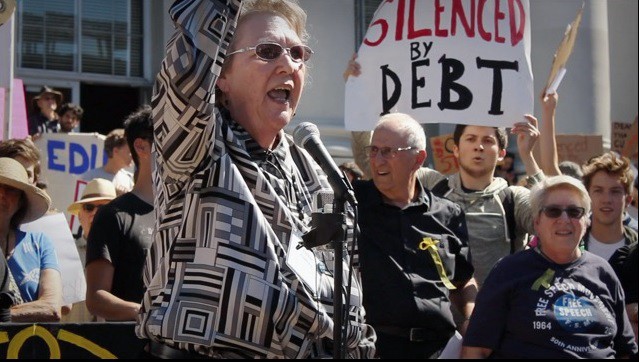Tracy Wares has made documentaries on five continents. She’s worked on projects such as “Bomb It,” “Gay Republicans,” and “Smokin’ Fish.” Wares’ work has aired on ABC, PBS, Sundance, Nat Geo, Discovery, A&E Bio, the CW, TNT, WeTv, Trio, TLC, and VICE online. Most recently, she’s directed and produced documentaries for VICE Media, including “Politics of Food” and “Ovary Action.” She is currently supervising producer for VICE’s women’s interest vertical Broadly.
“Political Animals” will premiere at the 2016 LA Film Fest on June 4.
W&H: Describe the film for us in your own words.
TW: “Political Animals” celebrates the legendary civil rights victories of the first four openly gay elected California state politicians, who were all women: Carole Migden, Sheila Kuehl, Jackie Goldberg, and Christine Kehoe.
Documenting the tough struggles they endured, the film celebrates their pioneering success in the fight for equality, and the sweet victories these unforgettable women created to pave the way for lasting and significant social change.
W&H: What drew you to this story?
TW: While the general public is familiar with men as historical figures in the struggle for LGBT rights, like Harvey Milk and Larry Kramer, very few people can name a women who has contributed to movement. I saw these women as unsung heroes who could inspire future generations.
W&H: What do you want people to think about when they are leaving the theater?
TW: I hope people are inspired by these women to participate in social movements and local politics. We are all used to signing online petitions these days, but to really create lasting change we have to come together face to face to exchange ideas, inspire each other, and provide support. As Margaret Mead said, “Never doubt that a small group of thoughtful, committed citizens can change the world; indeed, it’s the only thing that ever has.”
W&H: What was the biggest challenge in making the film?
TW: Most filmmakers today can relate that it’s increasingly hard to find funding for stories we are passionate about telling.
W&H: How did you get your film funded? Share some insights into how you got the film made.
TW: It helped us to focus our fundraising efforts on a select group of individuals that both had the means and the ongoing commitment to supporting the LGBT movement. We were generously funded by donations from members of the community who felt they had an interest in their history being told.
W&H: What’s the best and worst advice you’ve received?
TW: Being told that audiences won’t watch long form content on the internet just isn’t true. Even though our attention span is getting shorter and shorter, people do want media that matters and has an important story to tell. While its important to entertain audiences, its more important to inform them by moving them emotionally to care about a subject.
W&H: What advice do you have for other female directors?
There are a lot of options today for women who want to find other women in the filmmaking community. There’s a growing movement of collectives, online communities, and groups with regular events. We need to support each other and make efforts to hire female crew members from the immensely talented pool of women out there.
We also need to create new methods of directing and leadership that emphasize our strengths as women through collaboration. Though the film industry is sexist, racist, and hierarchical, we have the opportunity to trail blaze a new path of inclusiveness with our teams.
W&H: Name your favorite woman-directed film and why.
TW: Fortunately in the world of documentary the ratio of female directors to male directors is much more equal than it is in the narrative world. I think it has a lot to do with documentary filmmakers having to have a DIY attitude to survive. I admire any filmmaker that is dedicated to telling stories based on social justice or striving to create change with the powerful tool of media that we wield. For example, Laura Poitras has stayed committed to her craft in the face considerable harassment from the U.S. government, and Gabriela Cowperthwaite took on giant corporation in the face of legal threats and managed to both change their practices and take a chunk out of their profits.







